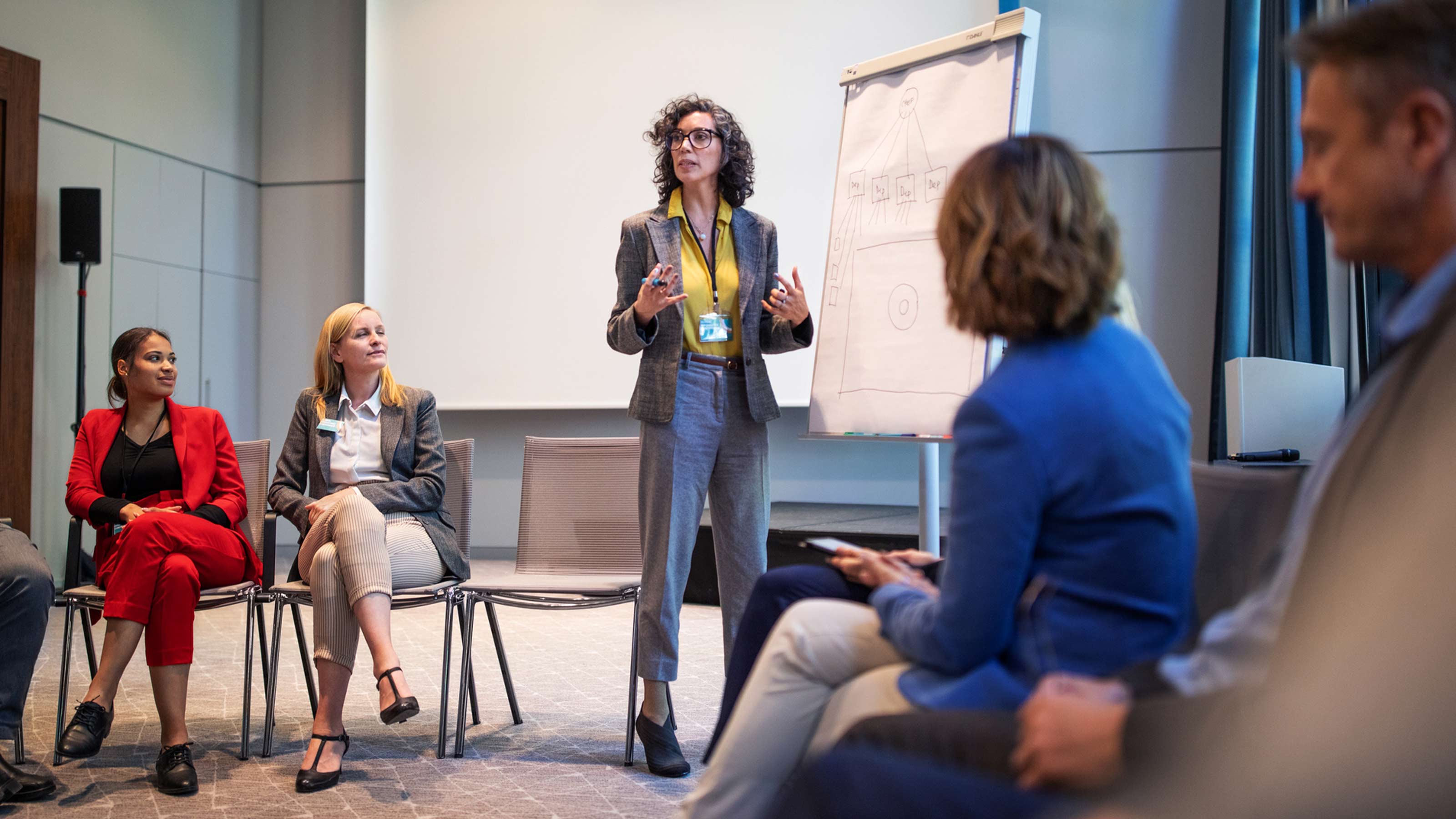Should You Invite Your Spouse to Join You in a Divorce Workshop?
When splitting up, you might think knowing more than your partner does about how divorce works might give you an advantage – but it doesn’t. Actually, it can be helpful to learn about the divorce process together with your soon-to-be ex.


Profit and prosper with the best of Kiplinger's advice on investing, taxes, retirement, personal finance and much more. Delivered daily. Enter your email in the box and click Sign Me Up.
You are now subscribed
Your newsletter sign-up was successful
Want to add more newsletters?

Delivered daily
Kiplinger Today
Profit and prosper with the best of Kiplinger's advice on investing, taxes, retirement, personal finance and much more delivered daily. Smart money moves start here.

Sent five days a week
Kiplinger A Step Ahead
Get practical help to make better financial decisions in your everyday life, from spending to savings on top deals.

Delivered daily
Kiplinger Closing Bell
Get today's biggest financial and investing headlines delivered to your inbox every day the U.S. stock market is open.

Sent twice a week
Kiplinger Adviser Intel
Financial pros across the country share best practices and fresh tactics to preserve and grow your wealth.

Delivered weekly
Kiplinger Tax Tips
Trim your federal and state tax bills with practical tax-planning and tax-cutting strategies.

Sent twice a week
Kiplinger Retirement Tips
Your twice-a-week guide to planning and enjoying a financially secure and richly rewarding retirement

Sent bimonthly.
Kiplinger Adviser Angle
Insights for advisers, wealth managers and other financial professionals.

Sent twice a week
Kiplinger Investing Weekly
Your twice-a-week roundup of promising stocks, funds, companies and industries you should consider, ones you should avoid, and why.

Sent weekly for six weeks
Kiplinger Invest for Retirement
Your step-by-step six-part series on how to invest for retirement, from devising a successful strategy to exactly which investments to choose.
As a financial planner, I participate in many different types of workshops, including for divorce. Due to the pandemic, these days they are usually webinars. Divorce is no exception. Should you suggest to your spouse that they should join you in a divorce workshop? Or do you want to keep the information that you got in a divorce workshop to yourself?
As a CERTIFIED FINANCIAL PLANNER™ professional, I often answer complicated questions with “it depends.” However, for this question, I will just say, “Heck, yes, bring him (or her) along!” People go to these workshops to learn how to get started with divorce. In the workshops that I run with Vesta divorce professionals, we equip attendees with the financial, emotional and legal information to help them make the right decisions about their marriage and their lives.
I recently recommended to a Vesta divorce workshop attendee that she come back to more workshops and bring her husband along. As it happens, they are still talking, and my workshops are still Zooming. So, she might be able to get him there.
From just $107.88 $24.99 for Kiplinger Personal Finance
Become a smarter, better informed investor. Subscribe from just $107.88 $24.99, plus get up to 4 Special Issues

Sign up for Kiplinger’s Free Newsletters
Profit and prosper with the best of expert advice on investing, taxes, retirement, personal finance and more - straight to your e-mail.
Profit and prosper with the best of expert advice - straight to your e-mail.
A Divorce Workshop Can Get You on the Same Page
The primary benefit of bringing your spouse to a divorce workshop is that you will start to get him (or her) on the same level of understanding about divorce issues.
The first step is understanding that divorce is emotionally difficult to negotiate for both sides. It is even more challenging if the two sides start from different vantage points. Just remember how you felt the last time you dealt with someone with a completely different perspective. For example, think of the last time you tried to persuade your toddler to eat his or her vegetables.
You and your spouse cannot have all your questions answered in one workshop or a dozen. Divorce is way too complex for that. But you will both learn something. And most importantly, you will both hear the same information and may learn the same thing. And that can form the basis for a productive negotiation and path forward.
You Can Get Some Valuable Guidance
If you and your spouse do go to the same divorce workshop, take it a step further and ask the questions on the points you disagree about. At the workshop, you will get a neutral expert opinion that may be helpful. Some of the issues you could get some clarity on:
- How to achieve financial success after divorce.
- Planning for retirement with a lot fewer assets.
- Whether you can or should keep your inheritance as separate property.
- The challenge of introducing the “D” word to the kids.
- The difficulties of comparing pensions to other assets in order to divide them up fairly.
- The tax consequences.
- The potential for a creative solution.
It doesn’t matter what the areas of disagreement are. You will both hear the same answer and have a starting point to move forward.
In war, you want to keep to yourself all the advantages that you can. Divorce may be war, but it is different in at least one respect: it pays to make sure that your spouse is as informed as you are, because that reduces your legal bills and gets you closer to the finish line faster.
Heck, it is also worth it to find out that your position might be incorrect. That too can form the basis for moving on.
You should note that what you hear in a divorce workshop can be great information, but it is not “advice.” Because every situation is unique, you will have to go back to a professional for objective advice. However, all journeys start with one step forward. Getting on the same page can be that important first step.
Profit and prosper with the best of Kiplinger's advice on investing, taxes, retirement, personal finance and much more. Delivered daily. Enter your email in the box and click Sign Me Up.

Chris Chen CFP® CDFA is the founder of Insight Financial Strategists LLC, a fee-only investment advisory firm in Newton, Mass. He specializes in retirement planning and divorce financial planning for professionals and business owners. Chris is a member of the National Association of Personal Financial Advisors (NAPFA). He is on the Board of Directors of the Massachusetts Council on Family Mediation.
-
 Nasdaq Leads a Rocky Risk-On Rally: Stock Market Today
Nasdaq Leads a Rocky Risk-On Rally: Stock Market TodayAnother worrying bout of late-session weakness couldn't take down the main equity indexes on Wednesday.
-
 Quiz: Do You Know How to Avoid the "Medigap Trap?"
Quiz: Do You Know How to Avoid the "Medigap Trap?"Quiz Test your basic knowledge of the "Medigap Trap" in our quick quiz.
-
 5 Top Tax-Efficient Mutual Funds for Smarter Investing
5 Top Tax-Efficient Mutual Funds for Smarter InvestingMutual funds are many things, but "tax-friendly" usually isn't one of them. These are the exceptions.
-
 Social Security Break-Even Math Is Helpful, But Don't Let It Dictate When You'll File
Social Security Break-Even Math Is Helpful, But Don't Let It Dictate When You'll FileYour Social Security break-even age tells you how long you'd need to live for delaying to pay off, but shouldn't be the sole basis for deciding when to claim.
-
 I'm an Opportunity Zone Pro: This Is How to Deliver Roth-Like Tax-Free Growth (Without Contribution Limits)
I'm an Opportunity Zone Pro: This Is How to Deliver Roth-Like Tax-Free Growth (Without Contribution Limits)Investors who combine Roth IRAs, the gold standard of tax-free savings, with qualified opportunity funds could enjoy decades of tax-free growth.
-
 One of the Most Powerful Wealth-Building Moves a Woman Can Make: A Midcareer Pivot
One of the Most Powerful Wealth-Building Moves a Woman Can Make: A Midcareer PivotIf it feels like you can't sustain what you're doing for the next 20 years, it's time for an honest look at what's draining you and what energizes you.
-
 I'm a Wealth Adviser Obsessed With Mahjong: Here Are 8 Ways It Can Teach Us How to Manage Our Money
I'm a Wealth Adviser Obsessed With Mahjong: Here Are 8 Ways It Can Teach Us How to Manage Our MoneyThis increasingly popular Chinese game can teach us not only how to help manage our money but also how important it is to connect with other people.
-
 Looking for a Financial Book That Won't Put Your Young Adult to Sleep? This One Makes 'Cents'
Looking for a Financial Book That Won't Put Your Young Adult to Sleep? This One Makes 'Cents'"Wealth Your Way" by Cosmo DeStefano offers a highly accessible guide for young adults and their parents on building wealth through simple, consistent habits.
-
 Global Uncertainty Has Investors Running Scared: This Is How Advisers Can Reassure Them
Global Uncertainty Has Investors Running Scared: This Is How Advisers Can Reassure ThemHow can advisers reassure clients nervous about their plans in an increasingly complex and rapidly changing world? This conversational framework provides the key.
-
 I'm a Real Estate Investing Pro: This Is How to Use 1031 Exchanges to Scale Up Your Real Estate Empire
I'm a Real Estate Investing Pro: This Is How to Use 1031 Exchanges to Scale Up Your Real Estate EmpireSmall rental properties can be excellent investments, but you can use 1031 exchanges to transition to commercial real estate for bigger wealth-building.
-
 Should You Jump on the Roth Conversion Bandwagon? A Financial Adviser Weighs In
Should You Jump on the Roth Conversion Bandwagon? A Financial Adviser Weighs InRoth conversions are all the rage, but what works well for one household can cause financial strain for another. This is what you should consider before moving ahead.